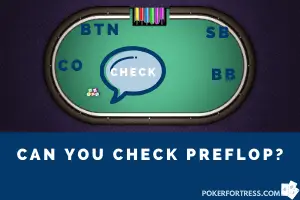When Do You Check In Poker
To make a play (check, bet, call, raise, or fold) at the required time, compare to in turn. Acting out of turn A player in poker that either announces their actions or physically plays before their turn (checks, folds etc). Sometimes players act out of turn intentionally to get a read out of other players. Learn to Play Poker in no time: poker tutorial is a great way to learn the card g.
Check is an action in poker when a player decides to pass the current round of betting. According to the rules of poker you can only play Check if you’re the first to make an action in the current betting round, or if no one before you had made any bets/raises.

- You can only check-raise when you are playing OOP. When you check in position (IP), you will just see the next community-card, and hence a check-raise is not possible. Rightly used, the check-raise is a sneaky weapon. If you aim to play game theoretical-optimal Poker, you must check-raise with good frequency’s.
- If you think that your opponent missed a draw and has a very weak hand, it may be more profitable to check in an attempt to induce a bluff. If you bet and it turns out they have no hand at all, then you are not going to win any more money because they are just going to fold.
To make a check in poker means to continue the game without any additional bets from your side. After the check action moves to a player sitting on the left from you, and you are having an option to make a fold, call or raise in future (if any of your opponents makes a bet after your check).
For example, you are playing at the table of NL200 ring game. You are sitting on the big blind position in this hand ($2), and during the flop betting all players have made a call of $2, thus equating their bets with yours. When it will be your turn to act, you will be able to make a raise, raising the bet, or either make a check and take a look at the turn card.
Check is a passive action, which often gives a sign of weakness.
Check in poker is used in the following cases:
When Do You Chop In Poker
- With an aim to take a free card, or with a reason to fold your cards if any of the opponents will make a bet after you;
- When a player is unsure in his cards, and because of that he’s not ready to risk a part of his stack (oftentimes in those cases check is played with an intention to call a bet from an opponent);
- Check with an intention to play check-raise, to lure as many as possible chips from the stack of your opponent. That kind of trick is used when you have a strong combination and you are sure, that your opponent will oftentimes attach your weakness (check).
Example: I haven’t hit the flop and was thinking if I should make a continuation bet, but decided to play check.
Knowledge base's sections
The best about poker
When Do You Bet In Poker
- Five reasons why I've made money and continue doing this playing pokerThe psychology of poker
- The fundamental theorem of pokerPoker theorems
- The probabilities of getting specific starting hands on preflopPoker mathematics